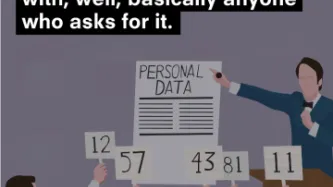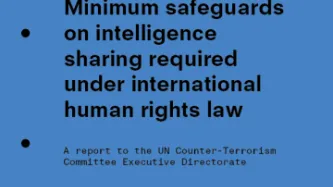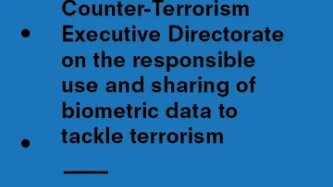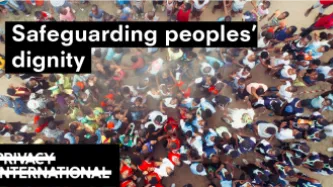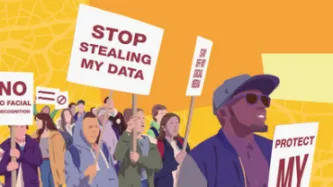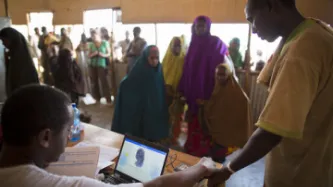Search
Content type: Advocacy
Privacy International provided comments to the UK Financial Conduct Authority on the Terms of Reference to its Credit Information Market Study.
We highlighted that:
Credit data (whether ‘traditional’ credit data; data from Open Banking sources, or other sources of data like social media) are hugely revealing of people’s lives far beyond the state of their financial affairs.
The affects upon consumer behaviour of this use of data in the credit sector extends beyond the choices they…
Content type: Advocacy
Dear Chair and Committee colleagues,
Privacy International is an international NGO, based in London, which works with partners around the world to challenge state and corporate surveillance and data exploitation. As part of our work, we have a dedicated programme “Defending Democracy and Dissent” where we advocate for limits on data exploitation throughout the electoral cycle.
We have been closely following the important work of the Committee. Prompted by the additional evidence provided…
Content type: News & Analysis
Privacy International has joined over 30 organisations working with migrants and refugees to write to the newly appointed British Home Secretary to raise a number of pressing issues, which require action if the immigration and asylum system is to regain the trust of the public.
The letter below was sent to the Home Secretary on Wednesday, 30 July 2019.
Find out more about PI’s work to demand a more humane approach to immigration based on the principles of fairness, accessibility, and respect…
Content type: News & Analysis
Picture Credit: US AID
US President Trump has been cutting aid to Central America, including a surprise cut of approximately $500m in aid to the “Northern Triangle” countries of El Salvador, Guatemala, and Honduras, apparently as punishment for “doing absolutely nothing” to prevent emigration to the US.
What remains of the funds is largely and deliberately being repurposed for spending on the US’s own security interests: indeed, one area which his…
Content type: News & Analysis
Foto: US AID
El presidente estadounidense Trump ha estado recortando la ayuda a Centroamérica, incluyendo un recorte sorpresivo de aproximadamente 500 millones de dólares a los países del “Triángulo del Norte” (El Salvador, Guatemala y Honduras), al parecer como castigo por “no haber hecho absolutamente nada” para impedir la emigración hacia los Estados Unidos.
Los fondos restantes están siendo reorientados,en su gran mayoría y deliberadamente, al gasto para…
Content type: Long Read
image from portal gda (cc)
Many people are still confused by what is 5G and what it means for them. With cities like London, New York or San Francisco now plastered with ads, talks about national security, and the deployment of 5G protocols being treated like an arms race, what happens to our privacy and security?
5G is the next generation of mobile networks, which is meant to be an evolution of the current 4G protocols that mobile providers have deployed over the last decade, and there are…
Content type: Long Read
Photo by David Werbrouck on Unsplash
This is an ongoing series about the ways in which those searching for abortion information and procedures are being traced and tracked online. This work is part of a broader programme of work aimed at safeguarding the dignity of people by challenging current power dynamics, and redefining our relationship with governments, companies, and within our own communities. As an enabling right, privacy plays an important role in supporting the exercise of…
Content type: News & Analysis
While people may think that providing their photos and data is a small price to pay for the entertainment FaceApp offers, the app raises concerns about privacy, manipulation, and data exploitation—although these concerns are not necessarily unique to FaceApp.According to FaceApp's terms of use and privacy policy, people are giving FaceApp "a perpetual, irrevocable, nonexclusive, royalty-free, worldwide, fully-paid, transferable sub-licensable license" to use or publish the…
Content type: Long Read
By Valentina Pavel, PI Mozilla-Ford Fellow, 2018-2019
Our digital environment is changing, fast. Nobody knows exactly what it’ll look like in five to ten years’ time, but we know that how we produce and share our data will change where we end up. We have to decide how to protect, enhance, and preserve our rights in a world where technology is everywhere and data is generated by every action. Key battles will be fought over who can access our data and how they may use it. It’s time to take…
Content type: Advocacy
During its 98th session, from 23 April to 10 May 2019, the UN Committee on the Elimination of Racial Discrimination (CERD) initiated the drafting process of general recommendation n° 36 on preventing and combatting racial profiling.
As part of this process, CERD invited stakeholders, including States, UN and regional human rights mechanisms, UN organisations or specialised agencies, National Human Rights Institutions, Non-Governmental Organisations (NGOs), research…
Content type: Advocacy
Faced with the transnational dimension of terrorist-related activities, United Nations Security Council resolutions have emphasized the need for international cooperation in information-sharing, both for the purposes of collecting intelligence and judicial assistance.
Privacy International recognises the importance and benefit of intelligence sharing in the context of preventing and investigating terrorism or other genuine, serious threats to national security. The organisation is concerned,…
Content type: Long Read
Photo By: Cpl. Joel Abshier
‘Biometrics’ describes the physiological and behavioural characteristics of individuals. This could be fingerprints, voice, face, retina and iris patterns, hand geometry, gait or DNA profiles. Because biometric data is particularly sensitive and revealing of individual’s characteristics and identity, it can be applied in a massive number of ways – and has the potential to be gravely abused.
Identification systems across the world increasingly rely on…
Content type: Advocacy
Identification system across the world increasingly rely on biometric data. In the context of border management, security and law enforcement, biometric data can play an important role in supporting the investigation and prevention of acts of terrorism.
This is clearly reflected in UN Security Council resolutions on counter- terrorism. Notably, Resolution 2396 (2017) the UN Security Council decided that states shall develop and implement systems to collect and share biometrics data for…
Content type: Long Read
Whilst innovation in technology and data processing have provided individuals and communities with new opportunities to exercise their fundamental rights and freedoms, this has not come without risks, and these opportunities have not been enjoyed by all equally and freely.
Our relationships and interactions with governments and industry have become increasingly dependent on us providing more and more data and information about ourselves. And, it’s not only the information we provide knowingly…
Content type: News & Analysis
By Ailidh Callander, Legal OfficerThis piece first appeared in the 500th edition of the Scottish Legal Action Group Journal (2019 SCOLAG (500, June) 124Political scandal, stronger regulation on privacy but what about social protection?In an increasingly digitalised and data driven world, an era of government and corporate mass data exploitation, the right to privacy and data protection and what this means in practice is more important than ever. Surveillance is a power generator and opportunity…
Content type: News & Analysis
Citing inaccuracy, major manufacturer declines to combine facial recognition and body worn cameras - but accurate or not, real-time facial recognition should never be coupled with police body-worn cameras
Axon Enterprise Inc.—a major manufacturer of police body-worn cameras and digital evidence management systems that also partners with Microsoft to provide services to law enforcement—announced that the company would refrain from equipping police body-worn cameras with facial…
Content type: Long Read
Everyday objects and devices that can connect to the Internet -- known as the Internet of Things (IoT) or connected devices -- play an increasing role in crime scenes and are a target for law enforcement. Exploiting new technologies that are in our homes and on our bodies as part of criminal investigations and for use as evidence, raises new challenges and risks that have not been sufficiently explored.
We believe that a discussion on the exploitation of IoT by law enforcement would…
Content type: Report
Like many others, PI were alarmed at recent reports that Facebook have been making mobile phone numbers (which users believed to be) provided for the express purpose of "two-factor authentication" (2FA) both searchable, and a target for advertising by default.
One of the myriad ways Facebook displays targeted adverts to users is through so-called "Custom Audiences". These "custom audiences" are lists of contact details, including phone numbers and email addresses, uploaded by advertisers.…
Content type: Explainer
We look at the recently published report on forensic science in the UK, highlight concerns about police not understanding new tech used to extract data from mobile phones; the risk of making incorrect inferences and the general lack of understanding about the capabilities of these tools.
The delivery of justice depends on the integrity and accuracy of evidence and trust that society has in it. So starts the damning report of the House of Lords Science and Technology Select…
Content type: Long Read
Image courtesy of Michael Coghlan
The long-speculated Facebook cryptocurrency is finally here! Libra!
Libra Association, an entity co-founded by Facebook, has announced the creation of a new cryptocurrency, Libra, "a simple global currency and financial infrastructure that empowers billions of people".
The white paper that outlines the rationale for the new currency makes a number of heady statements, some which anyone who cares about rights should commend -- and some which should…
Content type: Long Read
The UK public, regulators, and parliamentarians have all expressed concern about the wide use of third-party data by all political parties in the UK and its impact on privacy and democracy. In the week the remaining six candidates to be the UK’s next Prime Minister are reduced to two, Privacy International takes a look at their privacy policies to illustrate how such policies can be used to identify the use of third-party data by political candidates from all political parties.
The…
Content type: Long Read
IMAGE SOURCE: "My Phone Bought This" by oliver t is licensed under CC BY-NC-ND 4.0.
LAST UPDATE: 16th May 2022.
Mandatory SIM card registration laws require people to provide personal information, including a valid ID or even their biometrics, as a condition for purchasing or activating a SIM card. Such a requirement allows the state to identify the owner of a SIM card and infer who is most likely making a call or sending a message at any given time.
SIM card…
Content type: News & Analysis
One of the UK’s largest telecommunications operators, BT, has said to Privacy International that a report claiming it “co-produces malware” with a surveillance company for the GCHQ is inaccurate – but hasn’t said why or given any more details.
The accusation was made by C5IS – a shadowy online publication claiming to be “the most widely read source of information on surveillance technologies”. In its Big Black Book of Electronic Surveillance, it claims that SS8, a…
Content type: Case Study
In 2030 Amtis finds a future where property rights for data were adopted. Here’s how this future plays out:
My data, my turf. This was the first graffiti I saw as I was walking down the street and I said to myself, “Yeah, big corp, we’re going to get you good!”. I am fed up with companies making insane amounts of money from my data. If this is the game we’re playing, I want my fair share.
I was not the only one thinking like this. A few years back there was a strong push towards adopting…
Content type: Advocacy
Privacy International has today sent letters to leading social media platforms to ask what they're doing to protect their users' from dangerous surveillance by government immigration authorities.
The letter comes following the implementation of plans by US authorities to require nearly all visa applicants to hand over identifiers of all social media accounts they have used in the previous five years, or face “serious immigration consequences”.
The move not only represents…
Content type: News & Analysis
Privacy International has joined a global coalition of privacy campaigners, tech companies, and technology experts to respond to proposals by British intelligence chiefs aimed at allowing them access to encrypted messaging apps such as WhatsApp or Signal.
If implemented, the proposals would allow government authorities to force messaging platforms to silently add a law enforcement participant to a group chat or call.
Such a capability poses serious threats to…
Content type: Case Study
Photo by Roger H. Goun
Chloe is an investigative journalist working for an international broadcast service; we will call the TV show she works for The Inquirer. She travels around the world to work with local journalists on uncovering stories that make the headlines: from human trafficking to drug cartels and government corruption. While her documentaries are watched by many and inspire change in the countries she works in, you would not know who Chloe is if we were to tell you her real name.…
Content type: News & Analysis
US Immigration and Customs Enforcement (ICE), the agency at the centre of carrying out President Trump’s “zero tolerance” approach to immigration enforcement and family separation, has for years been contracting a US surveillance company to intercept peoples’ communications across the United States. The wide potential scope for the use of the powers raises concerns about their use for the real-time surveillance of people, families, and communities caught up in Trump’s immigration crackdown…
Content type: Advocacy
Refugees are among the most vulnerable people in the world. From the moment they flee their homes, as they pass through 'temporary' places such as refugee camps and detention centres to their 'final' destinations, they are continuously exposed to threats. In the digital age, these threats are increasingly being driven by the processing of vast amounts of highly sensitive personal data: from enrollment and registration processes needed for them to access services, to their identification and…
Content type: News & Analysis
We look at the recently published report on forensic science in the UK, highlight concerns about police not understanding new tech used to extract data from mobile phones; the risk of making incorrect inferences and the general lack of understanding about the capabilities of these tools.
The delivery of justice depends on the integrity and accuracy of evidence and trust that society has in it. So starts the damning report of the House of Lords Science and Technology Select…
